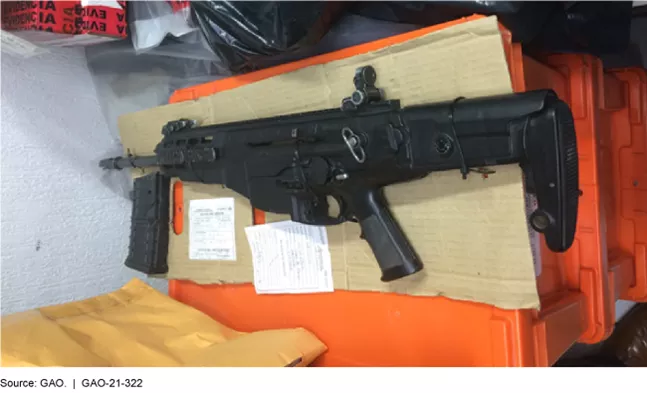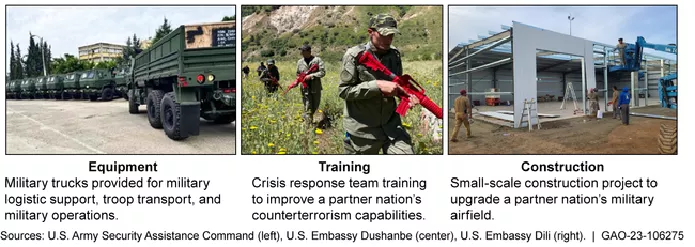International Security
Issue Summary
A variety of challenges, including terrorism, the trafficking of humans, narcotics and firearms, and the proliferation of weapons of mass destruction, threaten the security of the United States and of its allies. The United States has invested tens of billions of dollars to counter such threats during the past decade.
These diplomatic, development, and defense efforts, led by the State Department, the Department of Defense (DOD) and the U.S. Agency for International Development (USAID), have included providing assistance to help enhance rule of law, counter disinformation, combat terrorist networks, and confront transnational criminal organizations.
However, federal agencies could improve how they provide such assistance.
For instance:
- Ukraine. Russia’s February 2022 invasion of Ukraine has caused a devastating loss of life, widespread humanitarian crisis, and other global effects. There are a number of ways in which federal agencies could bolster oversight requirements, improve the monitoring of weapons’ use, and better track how funding is being used in Ukraine.
- Firearms trafficking. Trafficking of U.S.-sourced firearms into the Caribbean, Mexico and Central America facilitates the illegal drug trade and has been linked to organized crime and high rates of violent crime. However, U.S. agencies lacked information about firearms trafficking networks, and few U.S. efforts in the region focused on firearms trafficking. Further, agencies have not developed effective ways to share the information they do have on potential trafficking networks.
Example of a Firearm Recovered in Mexico
Image

- Cybersecurity. The State Department carries out American diplomacy and helps shape U.S. foreign policy. Securing the IT systems that support State's mission is crucial to its ability to manage its cybersecurity risks. But State hasn't fully implemented its cybersecurity risk program. We found that it needs to take several actions, including: implement processes to detect and respond to cybersecurity incidents, update hardware and software that aren't supported by vendors, strengthen the Chief Information Officer's ability to manage and oversee all IT infrastructure, and better communicate IT-related requirements to its overseas posts.
- Counternarcotics. Illicit drugs and the criminal organizations that produce and traffic them are a significant threat. DOD leads federal efforts to monitor the air and water transport of drugs like cocaine and fentanyl into the U.S. DOD set up a joint operation area including the western U.S. border and parts of Latin America. But 3 of DOD's regional components' areas of responsibility overlap this area, which causes confusion about who should manage which operations there. Documenting responsibilities in an agreement could help as DOD works to disrupt drug trafficking.
- Transnational repression. Transnational repression is when governments use threats or violence to silence dissenters living abroad. The 2018 murder of Jamal Khashoggi—a critic of Saudi Arabia—by Saudi agents in Turkey is a well-known example. But governments also use less visible tactics, like social media threats. It can be hard to detect the foreign connection to these crimes, and victims may be afraid to report them. And U.S. law doesn't define transnational repression, so federal agencies may not understand how extensive it is in the U.S.
- Combatting human trafficking. The U.N. estimates a third of human trafficking victims worldwide are children. The State Department creates partnerships or "compacts" with selected countries, like Ghana and Peru, to combat child trafficking. The U.S. and partner countries meet annually to discuss steps taken to address child trafficking. But State hasn't set key discussion guidelines for the meetings or measurable goals to assess countries' progress. Nor has it tracked countries' contributions or plans to sustain ongoing efforts. Doing so would help State better assess whether these partnerships are effective. Contractors that work with the government are prohibited from engaging in human trafficking. But allegations of trafficking persist, and the U.S. has said it's more pervasive than previously thought. DOD, State, DHS, and USAID spend a lot on contracts or may be at increased risk of using contractors who engage in human trafficking. These agencies have taken some steps to manage trafficking risks in their contracts, but none use a systematic approach that identifies, responds to, and communicates about risks and needed responses.
- Crime in Mexico. As close trading partners with a shared border, Mexico and the United States have a strong interest in each other’s security. The United States has provided Mexico over $3 billion in assistance since 2008 to address transnational organized crime and violence, enhance the rule of law, and reduce drug trafficking. But despite U.S. assistance, Mexico’s security situation has worsened significantly, with the country’s murder rate more than tripling between 2007 and 2021. The State Department and USAID have reported some outcomes of their assistance projects—such as amounts of trainings and equipment provided—but haven’t assessed results against the bigger goals.
- Assisting partner countries. During FYs 2018-2022, DOD allocated more than $5 billion to improve partner countries' ability to address threats like terrorism and drug trafficking. These projects provided equipment, training, services, and construction to national security forces. One such program (known as section 333) requires DOD and the State Department to jointly plan and develop "train and equip" projects—for example, training crisis response teams or providing military trucks for troop transport. But DOD hasn't worked with State to specify how and when State should be involved. Without a process for State's input, projects could be duplicative, not matched to partners' needs, or not aligned with State or U.S. priorities. Further, 75% of the projects' deliverables were delayed, limiting the projects' success.
Examples of DOD’s Assistance to Partner Nations through Section 333
Image

- Unauthorized use of weapons. According to the U.N., the conflict in Yemen is one of the world's worst humanitarian crises. The U.S. has long-standing security relationships with Saudi Arabia and the United Arab Emirates (UAE)—2 primary actors in the conflict—and has sold them weapons. However, DOD has not reported on—and State could not provide evidence that it investigated—incidents of potential unauthorized use of equipment transferred to Saudi Arabia or the UAE. State and DOD could use specific guidance for determining whether this equipment was used for unauthorized purposes.
- Assistance to Azerbaijan. To avoid worsening a dispute between Azerbaijan and neighboring Armenia, U.S. law generally restricts assistance to the government of Azerbaijan. However, the President may waive this restriction by notifying Congress that the assistance is necessary and won't hamper peace efforts between the two countries.The State Department, which makes these certifications, must report the assistance annually to Congress. However, the State Department didn't provide Congress with all required information—such as the impact of aid on the military balance between Azerbaijan and Armenia.
The following restricted reports are on related subjects. Members of Congress, congressional staff, and federal government employees who have the appropriate clearances and an official need-to-know may request access to these reports at https://www.gao.gov/reports-testimonies/restricted.
- Venezuela: Transnational Criminal Organizations Are Widespread and Have Varying Links to the Maduro Regime, GAO-23-105349SU. Published May 17, 2023.
- Venezuela: The Maduro Regime’s Permissive Drug Trafficking Environment Hinders US-Columbia Counternarcotics Efforts, GAO-23-105878SU. Published May 3, 2023.
- Security Assistance: DOD Should Improve Monitoring and Evaluation of Human Rights Training. GAO-23-105701SU. Published March 6, 2023.
- NATO Enlargement: President’s Reports on Finland and Sweden Address Senate Resolution Requirements, GAO-22-106060SU. Published July 8, 2022.
- Yemen: State and DOD Need Better Information on Civilian Impacts of U.S. Military Support to Saudi Arabia and the United Arab Emirates. GAO-22-105073SU. Published: Apr 27, 2022
- Iraq: U.S. Agencies Have Provided Assistance to the Ministry of Interior Since 2014, but Have Not Yet Fully Assessed the Effectiveness of the Assistance. GAO-21-288RC. Published: Feb 23, 2021
- U.S. Assistance to Mexico: State and USAID Should Strengthen Risk Management for Programs under the Mérida Initiative. GAO-21-112SU. Published: Nov 17, 2020
- NATO Enlargement: President's Report on North Macedonia Addresses Senate Resolution Requirements. GAO-19-574RSU. Published June 11, 2019
- European Deterrence Initiative: DOD Should Define Program Objectives, Identify Logistics Requirements, and Assess Prepositioning Decisions. GAO-19-190C. Published February 22, 2019
- Afghanistan Security: Some Improvements Reported in Afghan Forces' Capabilities, but Actions Needed to Enhance DOD Oversight of U.S.-Purchased Equipment. GAO-18-662SU. Published September 20, 2018


